Text
These traditions are centered around family, and my close relationships with my family is part of my identity, and therefore an important part of my self-expression. These pictures, to me, bring memories of the holidays, eating food that has been in the process of being made for days, and watching old home videos of times where things were very different. The game pictures, Guesstures, was my late grandfathers favorite, even though he could not speak or read English and my dad had to translate his cards to him. These memories make me happy. :-)
Some Familial Traditions



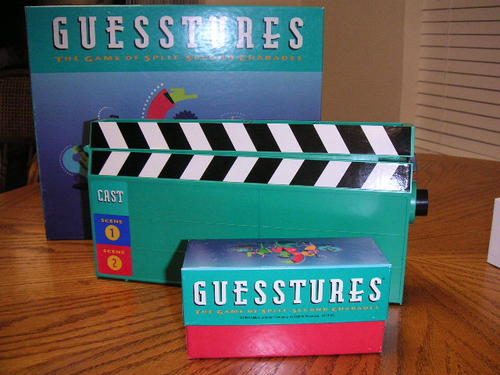
1 note
·
View note
Text
Final Portfolio
Introduction
My decisions for the posts I chose to include in my final portfolio were slightly challenging to make, considering I have made so much growth this semester, in my writing and as a person. However, I was able to use that growth and pinpoint the posts that I felt best expressed myself and the growth I feel I have made. Therefore, I will be posting one of the first assignments competed this semester, the self and shadow self-portraits described me at the beginning of the semester, the way I express myself externally and internally. Then, the etymology-experiment and vernacular post because that discussion post was the first time that I was able to examine and analyze the way my family and I communicate. The main project in my portfolio will be my origin story, as I believe that is an extremely fair representation of how I best express myself through creative writings and my family is a large part of who I am. I was also drawn to include one of the posts responding to the spoken word performances, because that was another time that I got to analyze people’s expression of themselves through their performances and it seems fitting to include. Another post that analyzed expression was the response to The Sopranos clips that discussed regional differences in expression, and I will also be including that. My peer responses will match this same theme, and because of how personal all of the projects have been, I will include the peer responses to all 3 major projects, the origin story, the spoken word project, and the critical media blog, as well as the self and shadow self. For my creative additions, I will add pictures that I feel reflect what progressions I have made in this semester. There are pictures included in my origin story project, but I will add images that follow the theme of self-expression through my other posts, and the appearance of my blog will also follow expression and self-identification through growth. My posts will be made on my Tumblr page in chronological order of the assignments, I will post this introduction post first and pin it to the top of my page, and then my origin story project. The discussion posts and peer-responses will be in chronological order, and all will have my discussions on each post attached, and lastly, my final reflection. I hope you enjoy!
0 notes
Text
I chose to include my origin story for my semester project because of what it means to originate something. The love story of my parents and the beginning of our family taught me what it means to spread love and kindness to all, which is something I hope to express through my writing and in my daily life. Connecting both of their stories together was something I had a very nice time doing, and I felt that learning from them as my resources made it even more special. I also feel like the creativity I was able to implement with the images from the year’s most of the stories took place made it a great addition to my portfolio.
The Origin Story Project
Victoria Manzo
Dr. Pooni
FYW 1000C
October 1st, 2020
The Origin Story- A Poetry Series
Mountains,
Combined with the bright blue water
And buildings stacked high up above one another.
Messina, Sicily, 1970.
Where my father was born and lived for almost 7 years to the day.
While unable to recall much, except the bountiful trees filled with fruit
That he would climb up and pick, even when they didn’t belong to him,
My father remembers the exact day he moved to Brooklyn,
2 days before his 7th birthday.
Moving into his new apartment in Bensonhurst, with 4 older siblings
None of which he ever got the opportunity to bond with.
He remembers eating Coco Puffs cereal when he arrived,
As it was what his grandmother had in their house that they now shared.
He was now a New Yorker, experiencing a vast difference from home.
His family were the typical immigrants,
Working until they no longer could,
No time for affection or expression of love,
Or any hugs or kisses goodnight.
He grew up in the midst of the most dangerous times in New York
Being forcibly kept out of the dangerous life he could’ve led,
By a cousin closer bonded than his own brother.
My dad’s relationships with his older siblings were never strong,
His only brother nearly 10 years older than him,
And 3 sisters in between,
He had to find his own people to care for.
Typical of a working-class family of the time,
My dad left high school before graduation to work.
He began to provide for his family at just 15 years old.
Working longer days than most children attended school,
He learned what it meant to be a contributor as a child.
No one believed that was abnormal or unjust,
When a family needed help, everyone stepped in.
Without realizing how detached it made him.
He was only a child,
A child now burdened with the responsibility of helping his family.
I believe that shaped him to be the man he became,
He will do whatever it takes to help his family.
Mountains,
Combined with the bright lights of the storefronts down State Street
And buildings stacked high above one another.
Schenectady, New York, 1974.
Where my mother was born and lived for most of her childhood.
She remembers the room she shared with her sisters,
And the smell of milk warming on the gas stove in the winter.
The frost on the pane glass of the windows,
Only being thawed by the warmth spread from inside the home.
My mother is unsure of when exactly her family immigrated,
Knowing only that 3 of her 4 older siblings moved from Rome
Following the death of her maternal grandmother in 1970.
Moving into her new apartment in Bensonhurst in 1984,
Above a Stop1 deli that no longer remains.
Told by her father that she was not allowed to leave the apartment.
She was now a New Yorker,
Differing drastically from life upstate.
Her family were typical immigrants,
Working until they no longer could,
Limiting affection and expressions of love to
Hugs and kisses goodnight between my mother and her father only.
She grew up in the midst of the most dangerous times in New York
If not in school, she was working at the video store next-door, the bakery, or the grocery store.
Allowed to be one of 3 places; her apartment, school, or work
Keeping her safe under her father’s close watchful eye.
My mom’s relationships with her older siblings were distant,
Her oldest brother, who was married by the time they moved to Brooklyn,
And another older brother and 2 sisters in between,
She remembers the fighting with her 2nd oldest sister, finding her own people to care about.
Her first friend being the link that brought her to her future.
Typical of a working-class family of the time,
My mom was allowed to miss school to work
Working as early as 11 years old, she found her career at 13, assisting for a dentist in the city.
She also worked for the man that would become her oldest sister’s husband,
At the grocery store he owned
She learned what it meant to be a contributor as a child,
No one believed it was abnormal or unjust, it was encouraged.
When a family needed help, everyone stepped in.
Without realizing how detached it made her.
She was only a child,
A child burdened with the responsibility of helping her family.
I believe it shaped her to be the woman she became,
She will do whatever it takes to help her family.
Her first friend,
Time barely allotted her to be social with people her own age.
Still working at 12 years old, she found time for her friend.
This friend brought her to the man that would become her future, my father.
My mother’s friend was another one of my father’s cousins.
They met when she was 12, and it was just assumed to be a schoolgirl crush.
August 1986, my mom saw my dad exiting a taxi,
Returning from a trip to Italy with his mother.
She remembers what he was wearing, a light blue velvet sweatsuit.
She saw him for the first time, and says she knew immediately.
June 1987, when both of my parents agree that they had officially met.
The rules of my mom’s household prohibited her from officially dating,
Though my dad did “ask her out” in September of 1987.
My mom got the older, handsome boy that she never thought would have given her a second glance.
My dad remembers her being like “one of the guys,”
A part of his group of guy friends, unafraid to stand up for herself when they would tease her.
They all hung out in my dad’s car,
My mom and dad, my mom’s niece, who’s only a year younger than her, and two more friends.
They grew up and got to know each other as the years passed,
And according to the rules of my mom’s house, at 16 she was allowed to officially date him
After a dinner with both sets of parents to approve of the relationship.
They dated steadily, until sometime around 1989.
My dad says he doesn’t remember what caused that break,
My mom says he told her he had cheated.
He told her to get out of his car,
On 10th avenue and 74th street
From which she walked home.
She played Air Supply’s All Out of Love on repeat for 3 days,
Then went on a trip to Canada with a cousin from Italy for around 5 days.
By the time she arrived home, my dad returned and asked her to be his girlfriend again.
My dad proposed to my mom on her 21st birthday,
He made sure she would never be able to go to a club or bar single
As he drove her to work.
He pulled out a fake rose that held a ring box inside,
Telling her just to open it
She recalls that she had to focus herself at work, placing veneers in Manhattan
Having to almost forget she was just proposed to in order to concentrate.
When she returned home from work that day, she went into her house to get
The engagement ring she bought for my dad 4 years prior for him to wear.
They were married nearly 18 months later to the day,
September 21st, 1996,
And moved into the home they raised my siblings and I in, that we still live in today.
My mom began the job she currently works in January of 1997,
I recently found out
My dad brought my very pregnant mom to his job interview for
The job he still has today in late 1998.
My parents were young, and starting their life together,
Preparing to start a family before either of them were even 30 years old.
They had already begun to expand their family when
In 1998 they adopted a 5-month-old Siberian Husky, Cody.
January 5th, 1999, my older brother was born.
Nearly 4 years later, October 10th, 2002, I was born.
2 years after my birth, we adopted another dog, a 6-month-old Lhasa Apso, Coco
6 years after I was born, August 8th, 2008, my sister was born.
April 6th, 2015, our dog Bella was born, and 21 days later, she was ours.
My parents grew our family and filled it with love.
Still children of immigrants,
They work until they no longer can,
But both parents proved with all of us that there is always time for affection and expressing love.
My parents were handed nothing
And worked to give my siblings and I everything we asked for,
They raised us to be hard-working and grateful for what we do have, even if it isn’t much.
Many traditions they made when we were growing up still remain today.
Only opening 3 presents on Christmas Eve, to save the anticipation-building feeling in our tummies till the morning.
Decorating the tree together, always the day after Thanksgiving, while playing Christmas music.
Each year the person who gets to put the angel on top of the tree rotates, so everyone gets a turn to hold that very important job.
Every person gets awoken on their birthday with a cupcake and an early morning rendition of Happy Birthday.
While some things change,
I no longer have to be put on my dad’s shoulders to put up the angel,
I’m no longer scared for my life when we go to our yearly haunted hayride,
I no longer feel the magic of Christmas, the imaginary sleigh bells on the roof when I fall asleep,
I am so grateful for everything they did to make my childhood the magic that it was.
I feel more connected with my parents than they ever felt with theirs,
As I know the struggles that they faced to raise us.
I know they are human, and they have emotions and problems aside from being parents
I also know the triumphs they have accomplished.
I have been fortunate enough to feel both of the likes with them.
Building our dream house in Schenevus, New York.
Rolling hills filled with trees and colors unimaginable in nature,
Combined with the serenity of the emptiness,
Mountains.

1 note
·
View note
Text
I chose the first discussion post to be the self and shadow self-portrait as it was one of the first assignments of the semester, it would be a good comparison for the growth of my writing throughout the semester. Also, because of the basis of the assignment, I am also able to compare my growth as a person since the point of writing it, and I notice I actually disagree with much of what I wrote. Now, I am more sociable through texting and FaceTiming with people in my friend group that I had never even spoken to up until 2 months ago, and I currently feel much less isolated and more involved. I am proud of how far I’ve come since then.
The Self and Shadow Self-Portrait
Victoria Manzo
Dr. Pooni
FYW-1000C
Sept. 3rd, 2020
Self portrait:
Monologue
How often is it that one truly resembles the person they present themselves as? Is it all a façade, different color paints added to the never-ending work of who we are? Every person we encounter meets a slightly different version of ourselves, and every encounter we have removes us further from the person we once were. If no one ever gets a true representation of what kind of person we are, is anyone ever aware of who they are? People often say that those closest to us, those we are most comfortable with know us the best. People like our parents, our siblings, our best friends. But what version of us do those people know?
It becomes a sort of identity crisis, being equally sure and unsure of who you are. To others, I am sure I am kind, patient, supportive, and all the other traits I’ve learned to obtain over the years. Now, exactly what mixture of each of those traits the people in my life perceive me as is dependent on the individual. For example, the person who cut me off while I was driving most likely has a much different perception of myself than my best friends. I am sure that when I am in control of the interaction, my actions and behaviors paint me to be the type of friend I want to be, but am I really them? Something that often troubles me is that, no matter how hard I try and control my interactions, I will never be fully sure of what someone thinks of me. There will always be variables I cannot control in the total summation of my interactions with other people. I’ve tried to train myself to never assume anything about anyone: using gender neutral pronouns if I cannot directly ask the person what their pronouns are, answering I’m not sure when someone asks me what I think a person’s sexual orientation is in fear of accidentally outing them, being aware of commonly triggering topics (food, abuse, etc.) and adjusting my sensitivity to the topic in discussions. And it’s not that I am unhappy that I’ve trained myself to be this way, while I may be called overly sensitive and a “snowflake,” I would much rather me be excessive with my caution than be a contributor to someone’s internal struggles with their identity. But in turn, this has led me to question my own identity. Do I approach these subjects in this manner for fear of the way people might think of me otherwise, or do I do it because it is the right thing to do?
At times it begins to feel as if the person I’ve created to show outwardly is my shadow self. The outgoing and seemingly fearless is just years of training in becoming the person I want to be taking over? Even if that is the truth, I still feel a desire to be a better person than I am, constantly feeling inadequate and insufficient in my efforts to show those I care about how much I truly do care for them. Which is why I believe that the person I make myself known as, is my shadow self. My true inner self is one that is never satisfied, constantly wanting to do more in order to fill the void that creates an empty vacuum sucking all of the effort I put out into its unquenchable mass. My perfectionist nature takes over every aspect of my life, my need to be a “likeable” person drowning whoever my base self is. When I am alone, seemingly the most myself I can get, I feel like a shell. All of the good parts of me are brought out only around other people because I feel as though that is who I need to be.
Eventually, this crutch I have developed as a way to make interactions ideal will become null. I will have to learn how to mold the colors on the canvas together, mixing them until they create the average of all colors. While it may not be as beautiful as the individual colors in their full glory in the painting, it will be a more accurate representation of what being a human is like. No single person can perfectly choose all of their best moments to be on constant display, and continuing to push myself towards a clearly unattainable goal is self destructive and counterintuitive. At some point, I have learned enough from this person, this character I have created, to learn cues for my true self. The relationships I have developed have a strong enough foundation that this could be who I am, it just currently is not. Avoidance is a powerful tool, and once you choose to face up to the things you have pushed away, there is an overwhelming amount of making up to do. To be the person I have created, I first have to own up to altering myself in an attempt to minimize loss of friendships, relationships, and minimize potential conflict. Being the ideal and perfect person is a fantasy for a reason, it begins to destroy you when you get too close.
Shadow self:
Poem
Many people would rather hide their shadow selves
Usually containing the darkest parts of oneself
I fear the darkest parts of me are who I truly am
Anything better is merely the character of myself that I have created.
Looking in a mirror when I’m alone,
Stripped bare of any additives to my personality
Artificially creating the person I wish to be versus
The person I am,
Watching a clone of myself.
Visually, I look the same
In the most basic sense we are the same
The layers I have added as separation acting physically and emotionally
Distancing myself further from who I am at my core.
Every person I encounter has their own internal dilemmas
Over 7 billion trains of thought I will never be privy to
On the rarest of occasions,
The people around me catch glimpses of this inner self
Reserved to the back of the crowd
Rather than forcing myself to fill the room with my curated presence
Adjusting and covering up when questioned on the shift in my activity
Mentioning feeling tired and my metaphorical social battery running low
Everything’s fine, don’t worry about me.
Eventually the feeling passes
Reverting back to my trained natural state
Bubbling to fill the room with what it needs
Always catering to those around me
Successful tactics draining me with each use
Cracking through the dam I have built
As it is unable to withstand the pressure of attempting perfection.
1 note
·
View note
Text
The origin, vernacular and language post was chosen because of how intimidated I felt by that assignment. I remember looking at the blank page on my computer screen wondering what things I say that are significant enough to analyze. I looked into myself and thought of just the things that make me happy, and that made them important enough to study.
The Origin, Vernacular, and Language

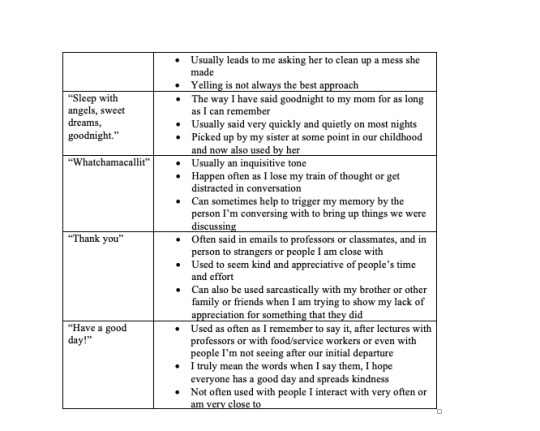
Victoria Manzo
Dr. Pooni
FYW 1000C
Sept. 17th, 2020
1. Dude- It is said that the word dude originated from an abbreviation of ‘Doodle’ from the phrase ‘Yankee Doodle,’ possibly referring to the ‘dandy’ the song is directed to from late 18th century British soldiers occupying the colonies during the revolution. The end of the 19th century brought primped and preened men donning the highest of fashion at the time (silk cravats, shined shoes, striped vests, and tapered trousers) created the attitude of what being a Dude in America means. Personally, I began using the term more often as a joke earlier this year and have now began to use it to informally address friends unironically.
2. Honey- The use of honey as a name, or nickname, is derived from the Old English word “hunig,” meaning honey, used to refer to someone who made/sold honey or kept bees. It also was used as a term of endearment in Middle English, with a similar connotation to today, meaning “sweetheart,” or “darling.” In my own personal speech, honey is used with people I am not as close with as a way to ensure that the friend I am speaking to can be completely comfortable with me.
3. Sweet dreams- Sweet comes from “pleasing to the senses” in Old English, as well as many iterations in Old Saxon, Old Frisian, Swedish, Danish, Middle Dutch, Dutch, Old High German, and German, all translating to sweet, pleasant. The earliest recorded use of Sweet dreams as a goodbye, sweet dreams to you, parting speech where one person is going to sleep, was in 1897. As stated in my language log, I am not sure when, or why, I began to say goodnight to my mom like this, I have done it for as far back as I can recall and say it to her on most nights.
4. Whatchamacallit- As strange as this phrase may seem, there is a long history behind it. The contraction was first noted in 1928, compressing the phrase what you may call it from the 1630s. Before the expanded version in 1630, what-calle-ye-hym came in the late 15th century. I use this phrase extremely often, as I’m describing the assignments I have for the day to my parents or on the phone with a friend catching up after a few days of not seeing each other.
5. Have a good day- Always used as another parting term good-day originating as early as the 12th century. Different iterations have passed through the time, from “a fortune day,” to haue godne day as salutations in the early 1200s. As a society, I feel that most people are not as kind as they should be, and it’s very simple to just wish somebody good the day of your interaction and truly mean it, and that’s why I chose this phrase as well.
PART 2: Literacy Narrative
It is widely known that there is no official language in America. That being said, especially in northern states, English is most common. During British occupancy of the 13 colonies, English was made the official language after the Dutch and other European countries had taken a majority in the New World. Linguistics from the time of Old English, where the majority of the terms I have chosen, originate from, have changed drastically, including slang and dialects affecting regional speech.
The words I chose to analyze are phrases I see myself most commonly using. While, especially in quarantine, the majority of my interactions are extremely informal, these terms once came from a place of formality in greetings or partings. For example, sweet dreams to you was a more common way to say goodbye/goodnight to someone you cared for. Relationships were much easier to distinguish when English had different levels of formality. In the majority of languages other than English, there is a clear distinction between the formal and informal ‘you.’ This is said to be because of a gradual declassification of the language, as ‘thou’ was originally the informal and ‘you’ was the formal version of the word. America was built because of the need to push away from the hierarchal standards of Britain, and this is seen in the way our languages progress through time. The original distinctions might have been easier in understanding social cues, but they drastically changed the attitude of Americans towards other Americans, removing any innate superiority that might have been seen otherwise.
Even though the superiority might not be innate due to the structural rules of the English language, it still exists for other reasons. There is an extremely xenophobic and bigoted idea that anyone in America needs to learn to speak English, which is extremely harmful to immigrants and non-English speakers. Every culture we interact with, especially in the melting pot that is New York City, affects our own linguistic adaptations. Personally, both sides of my grandparents, as well as my father, immigrated from Sicily to New York. My grandparents never fully learnt English, and used their children (my aunts, uncles, and parents) to help them get by. They learnt what was necessary for survival, and worked equally, if not harder, than any English-speaker. I would not call myself fluent in Italian, by any means, and I think my lack of education in the language stemmed from shame, as my parents tried to American-ize my siblings and myself as much as possible to eliminate hardships rooted in hatred, and I only speak it around my grandmother and parents, rarely due to lack of confidence. While speaking Italian in public is not as dangerous as speaking Spanish or Arabic, for example, as it is a European language from a white country, it still is a universal struggle of many American immigrants. When discussing racism surrounding linguistics, it is imperative to discuss African American Vernacular English, or AAVE, as well. This is defined by Merriam Webster as a nonstandard variety of English spoken by some African Americans. It is evident in many of the slang, “internet culture,” words known today: period, fam, finna, etc., as these all originated in the separate version of English known as AAVE, which are regularly seen as too informal and inappropriate with unprofessional context. These terms cannot be used without understanding the historical significance, and the generational knowledge passed through Black Americans, as that erases the hardships endured for hundreds of years in this country. Language goes much deeper than solely words, it is communication across generations and countries, that provides a solid foundation for our development as individuals and Americans.
In summation, language can be an extremely personal subject. It is an easy detection tool for xenophobic people to use and harass people, even though knowing multiple languages is directly related to higher intelligence, some people claim that not learning language is a sign of laziness and un-American. I have never needed to code switch, as my version of English is considered professional enough to use in all settings, and that is a privilege. I also make sure to consider the hard work of my grandparents when I educate myself on the plight of American immigrants, as connecting stories to my own personal ones make it much easier to empathize and give my efforts to help immigrant voices be heard.
1 note
·
View note
Text
I chose the second week of discussion posts because I felt more connected to the performances of that week than the one previous. Jamila Lyiscott and Olivia Gatwood’s performances were very influential in my own spoken word project. I liked getting to explore this mode of expression, as spoken word was an art form I had always been interested in but never had the chance to research and explore, which this assignment gave me an opportunity to do.
Spoken Word Discussion Post 2
Victoria Manzo
Dr. Pooni
FYW 1000C
October 15th, 2020
Spoken Word Discussion Post
The first video I watched, and one that stuck out to me to react to, was “3 Ways to Speak English” by Jamila Lyiscott. Even though the performance was dated in 2014, the issues she discussed have proven extremely relevant lately, with the discussion on African American Vernacular English, or AAVE/Ebonics. I have found it very interesting to listen to different opinions and perspectives on the issue and have spent a lot of time learning about code switching and how it applies differently to different cultures, especially Black Americans. I also immediately noticed Lyiscott’s rhythm, the way she phrased her words to continue with the natural rises and falls of her inflection and storytelling. She used her entire body when she was performing, especially in her different “languages,” or mimicked her father or friends. Also, her explanation of the laws of her language, using the example that you cannot use “madd” in front of a present participle is a very clear explanation on the concept of AAVE and why it differs from just a slang accent, it is a language with different rules and a history other than English. She uses examples of her 3 tongues throughout the performance, and definitely showcases her multilingualism. It is nontraditional to use the example of her professor saying, “hello,” being unprofessional, and the correct way in her language would be “what’s good,” because its challenging the notion that the vernacular specifically used by the Black community most often is seen as unprofessional, when is reality it is just a language separate from English. My immediate reaction is admiration of the bravery it would take to have to cover up the way you naturally talk in fear of being called incorrect or unprofessional, and the issues that would cause with identity. The vernacular practices that exist in my life are miniscule in comparison, only guides me in better understanding in the way I feel when people say I sound so New York when I speak as fast as I do.
The next video I wanted to react to was Olivia Gatwood’s “Ode to the Women on Long Island.” I had actually seen this video circulating social media recently, specifically the part about finding out a girl was murdered and calling their sons to warn them what would happen if they ever made a girl feel that uncomfortable. This performer seems slightly less comfortable than the previous, reading her poem off of a paper and not really reacting to the audience’s interaction, however I still think this is an excellent performance. It speaks highly to the type of aggressive parenting many of my friends and I envision for our future. She is doing a good job at highlighting the innocent ignorance of this specific stereotype, with her example of the very happily married metaphorical lesbian friend, and holding all men accountable for their actions, even their own husbands and sons. Two words she used very accurately described the entire general idea she is writing this poem to, unstartled and furious, taking things as they come and angry about the injustice and havoc they wreak. I wouldn’t say she is using multilingualism, rather I think she is demonstrating the ability and the choice that needs to be made to stand up for what’s right, as yoga- class attending mothers can very easily ignore the things that do not directly affect them, and it is much more difficult to actively work against them. This poem is probably very similarly written as it was performed, however her Long Island accent used is successful in giving the audience member the exact image of the type of woman she describes with it. I relate slightly more to this poem than the last, as I hope to be that aggressively kind and active human and parent that sticks up for justice even when it is the more difficult decision, that could go against my family or the ones closest to me.
1 note
·
View note
Text
The last discussion post I chose was the multimodal critical analysis, discussing The Sopranos. I felt as though the clips analyzed were reminiscent of things I’ve noticed in my own family, especially with the difficulties the characters face in Italy. Though I have never been, when I’m around family that only speaks Italian, I feel excluded and like I have nothing to contribute because I cannot speak as fluently.
Multimodal Research and Critical Analysis
Victoria Manzo
Professor Pooni
FYW 1000C
November 6th, 2020
Multimodal Research and Critical Analysis
Part 1:
Immediately, I react very comfortably to the startling derivation of the Italian language, considering that I grew up in Staten Island, and family directly immigrated from Italy. My family’s language more closely resembles the modern-Italian Nosowitz described, however it is so common to interact with people here that have the jarring “Italian” accent that it does not shock me. The stark differences are because of the fact that many of the people with this very specific accent do not even speak the Italian language it derives from. So, where does it come from? Nosowitz does an excellent job at explaining the historical significance of the derivation of the Italian accent, “most Italian-Americans can trace their immigrant ancestors back to…when the vast majority of ‘Italians,’ such as Italy even existed at the time, wouldn’t have spoken the same language at all, and hardly any of them would be speaking the northern Italian dialect that would eventually become Standard Italian.” The Sopranos further demonstrates Nosowitz’s point, as their trip to Italy made use of translators to get their point across, their Italian wouldn’t be understood in Italy, but they all still have the classic accent in their English. Specifically, the scene where Paulie is trying to order at the restaurant in Italy shows the disparity between the languages. He asks for “macaroni and gravy,” and the people dining with him can understand that what he really is asking for is pasta with tomato sauce. Food is an excellent visual to the distance Italian Americans have from Italians, as many the culture of Italian Americans remains mostly in its food, as Nosowitz says, food and curses are the hardest part of the culture to die. It is something that shows most of the accent in “gabagool, mutzadell,” and more, and it is a clearly alive and well part of Italian American culture. In the compilation clip of “the Sopranos but just gabagool,” the mutation of the word “capicola” should seem drastic and jarring, but no characters are shocked by it, and everyone who says the word uses the same dialect.
New Jersey’s Italian immigrants between 1861-WW II, when most immigrants came, come mostly from Genoa and Naples, but any Italian immigrant might not consider themselves of Italy, many taking place in regional pride, as each region of Italy was its own kingdom placed together, and the Standard Italian language of Tuscan was developed following the migration of many Italians to America. This would distance the languages even further, as the generations pass and don’t pass the language on with them, as well as the languages being extremely different before and after the Standard Italian was formed, causing it to nearly die. The clips of Tony and Paulie in Italy are the most telling in terms of how far the language has come. Neither of them can confidently communicate with the people they are with on their own, when making the deal with them, Tony explains all of his terms in English and lets the man sitting next to him translate, the same happens to Paulie when he is speaking to the man near the water. Their usage of English to the people they are around does have a connective purpose, as it uses a third person, or “middle-man” to bridge the gap between Italians and New Jersey Italians. Symbolically, that “middle-man” may represent the generations passed between their lineage’s migration and themselves. It would be extremely isolating to the Italian Americans, as they feel disconnected from their culture and heritage because of their disconnect to the language.
Part 2:
• “The other day…”- This phrase can mean at any point approximately in the last 2 years. It is usually pronounced “the otha day,” making point of Nosowitz’s point of the dropping of the last syllable for increased consonant-vowel-consonant form.
• “What are you talking about?” – This phrase can be used for literal or figurative confusion. It is usually said to decrease the validity of a statement said previously and mostly is pronounced with an emphasis on the vowel in “talking.”
• “Get out of here” – This phrase is used similarly to the other two and is mostly meant to discredit previous statements. By implying that the person should just leave, it would make any argument look weak. This again usually is pronounced by dropping the consonant on the end of “out” and combining it with the “of” for the easy flow Nosowitz speaks of.
• “Did you grab the jars?”- This phrase isn’t as frequently used, however relates to the use of food to keep a small part of the Italian culture alive. Like many Italian Americans, my family makes tomato sauce at the end of every summer, and it is definitely a connection to the culture.
• “So, I says listen…” – This phrase is similar to the others in that it is a way of recalling and retelling stories or experiences. It also employs the accent rules Nosowitz describes, dropping the last syllables, draws out the vowel sounds, and consonants switch between voiceless or voiced. This phrase and the words that follow are usually clear examples of the shards of the Italian language pushed into English by Italian Americans who’s lineage started anywhere between 1861 and the early 1940s.
1 note
·
View note
Text
Peer Response to the Origin Story Project
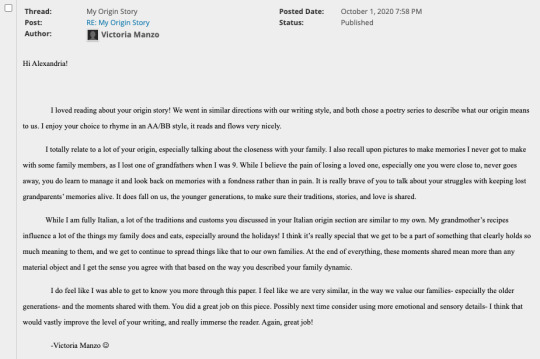
For my peer responses, I feel like my response to the first of the 3 semester projects was a good choice to include because it is representative of the way that I interact with people, and the way I hope to be perceived. That was an issue I had toward the beginning of the semester, was the way other people perceive me being out of my control and my discomfort surrounding that. I feel as though I have begun to understand how to make myself comfortable with being perceived, so I am including this peer response for comparison of the growth I’ve made.
0 notes
Text
Peer Response to the Spoken Word Project
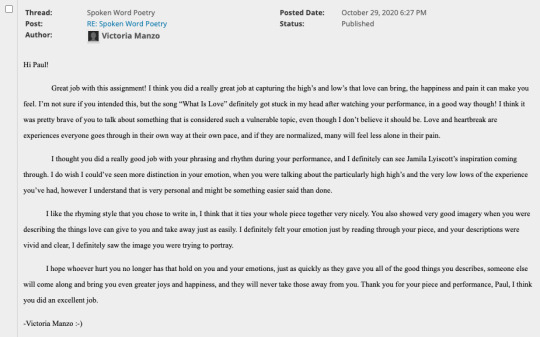
The spoken word peer response I enjoyed because it was more so about the performance. I had only responded to written posts in the past and being able to watch the VoiceThread performance and respond was reminiscent of the way we would’ve gotten to react to each other’s performances if they were in-person. I also feel like I had gotten comfortable enough to include some constructive thought I had regarding the performance.
0 notes
Text
Peer Response to the Critical Media Blog Analysis Project
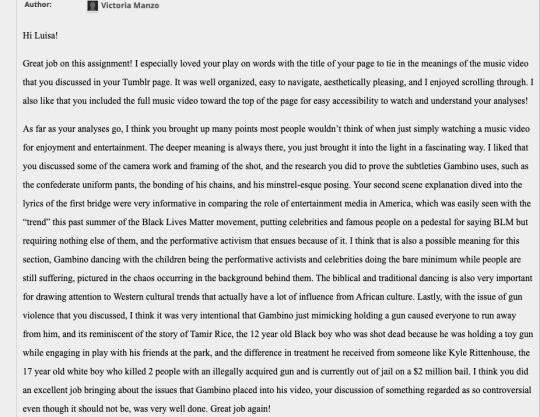
The third project, the critical media blog, was very interesting to respond to. This differed greatly from my perspective on why I included the previous peer response, and I feel if we were in-person the assignment would have been responded to much differently. However, I thoroughly enjoyed looking through my classmate’s creativity, and the conversations that could be started because of them, such as what I wrote about in my peer response post.
0 notes
Text
Peer Response to the Self and Shadow Self-Portrait Assignment
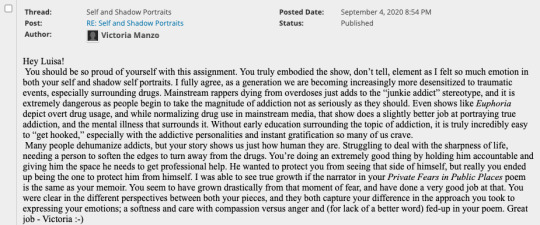
Lastly, I am including my peer response to the self and shadow self-portrait because I believe it completed the circle of comparison for my growth during this semester. I was still able to start a discussion regarding the post I responded to, but my response seems almost timid. Comparing it to my most recent peer response, from the critical media blog, I see a vast amount of growth completed in just over 3 months and I am very proud of that.
0 notes
Text
Final Portfolio Final Reflection
Beginning the semester freely expressing myself in the self and shadow self-portraits, I wrote as openly as I thought myself able, and discussed things I had never gotten to discuss in writing before. I was someone who hadn’t enjoyed writing, or even wrote outside of rhetorical analysis essays, in years, and this assignment to start the semester off with a brand-new mindset about creativity and how I would be able to express myself. By this point in the semester, I have changed drastically. Though difficult in the third wave of the pandemic, I have become more open to casual friendships, and in doing so, made myself become okay with having other people perceive me. Having no control over my identifiers was something that scared me 3 months ago, but through growing and writing and learning, I have begun not to care in the best way. A project that stuck out to me, though not included in this portfolio due to space, was the spoken word project. I feel as though my spoken word poem was where a lot of my growth happened. As I was writing it, I got a phone call from a more distant friend and got closer to them that night. Talking about perfectionism has been the greatest way for me to overcome it, and the new mode of expression through spoken word was the perfect amount of drama and creativity for me that I even told my mom I would like to look into doing other spoken word performances in public.
My writing has been altered as I have evolved, I feel much less afraid about what I write and how I respond to people now. While I still make it my mission to spread as much kindness as I can, I no longer overthink my words before submitting them to the point of changing them to be more palatable or easier to agree with. I have stopped watering myself down to make others more comfortable. The thing I think most important when beginning a writing process now that I have completed First Year Writing would be to not let any assignment intimidate you. I have written more papers and assignments this semester than I had in all 4 years of high school, even as a diligent student. No matter the size of the assignment, do what makes you happy, because that makes it important, and don’t stress over the way people can interpret your words. That is the reason writing as an artform is so beautiful, because perception is so incredibly individual you can never make 2 people feel the same with 1 piece of writing. I have gained the skill of trusting myself in my work and begun to see the confidence that comes with that. I still struggle before submitting assignments, wondering if I somehow interpreted all of the questions or prompts wrong and will get a bad score because of it, but I slowly gain the skill of being proud of the things I create no matter the score it receives. The most difficult thing I encountered was something I was unaware was even happening, as I slowly learned to let my own inhibitions go, they left my writing as well. I can now look at a large assignment and break it down over however many weeks necessary to complete it rather than waiting and letting it loom over me. I feel a little like Kevin in Home Alone, “I’m not afraid anymore!” I am no longer afraid of making things perfect, and obsessing over them until I can’t even think about it anymore, because that is unattainable and unsustainable. I do not need to be perfect, I just need to be proud of what I create.
0 notes
Text
All posts below this are for my close read of the Adore You music video.
All posts above this point are for my final portfolio project! :-)
0 notes
Text
Who Saved Who? Sacrifice in Harry Styles’ Adore You
youtube
Introduction
This close read will be discussing the extended version of the music video, Adore You by Harry Styles. The structure of this blog will go in-detail analyzing 5 specific, key scenes from the extended version of this music video. Scrolling down this page will reveal the specific scenes and timestamps of the music video and the close read analyses accompanied by the embedded video clips. It will be in the appropriate order, with this introduction at the top, followed by the scenes in chronological order throughout the music video.
Though I believe the entire music video can be analyzed thoroughly, I will provide the most influential scenes that portray the idea of transforming hatred to love. The Isle of Eroda, shaped like a frown with a perpetual gloomy overcast, with an equally as gloomy population, is met with their match when The Boy, with a smile like no other, changes them. That brightness, the literal and metaphorical light he holds, is the thing he is targeted for. Described as extremely superstitious, following strange traditions with no question, the island is a place where change is uncommon, such a stark difference from the norm meant horrible treatment for The Boy. Unintentionally or not, this social excommunication led The Boy to hide himself and his smile, leaving the world just as dark a place as before he entered it. Following a similar path, the peculiar fish found The Boy at both of their lowest points, ready to end their own lives for the sake of making others happy. Highlighting the injustices unique people face solely because of fear of the unknown is what this music video does best, and it shows that all people who stand out find a shared connection in that struggle, the universal experience of exclusion. That connection can be the thing that saves a life, as it does with The Boy and the peculiar fish. At times, that connection, while understood by both parties, needs to be severed to continue to thrive, grow, and learn to love themselves for their differences even more, and that is something else this video portrays. Sacrifice for the things you love, to better oneself, is the ultimate test of love.
1 note
·
View note
Video
0:46-1:21 - The Peculiar Boy is Born
The Boy’s differences, his blinding smile, immediately turned his world in Eroda away from him. The different experiences shown of the boy all proved that ignorance creates hostility, the close-mindedness of the people of Eroda forced The Boy to isolate himself for fear of the way he would continue to be treated. Ignoring him rather than learning about him or learning ways to best coexist with him is where this storyline emulates our society. The frown-shaped island on the globe pictured in the beginning, the consistent overcasts, and lack of contrast and vibrancy in the videography portray this dull way of life. To keep them comfortable, The Boy isolates himself, feeling this pent-up anger and frustration that he cannot express to anyone but himself because of his distance from all of the other Erodeans. There have been no lyrics yet, only the single female narrator talking about The Boy’s experiences, a smile so powerful that people felt the need to protect their skin with sunscreen or umbrellas, in a world full of people accustomed to the permanent frown, Resting Fish Face. In an exaggerated way, this storyline matches the experience of many, a quality that people are unaccustomed to being the quality they are targeted for and can be any number of things, dark skin, acne, birth marks. Like The Boy’s smile, people turn away from things they are not used to, and assuredly into resentment, further isolates them from humanity in the people around them. Between having no connections with anybody, no relationships or support system to have, and the shunning from society, unique people have nowhere to turn to express any feelings, of happiness, sadness, indignation, etc. and the thoughts that follow can create a lack of internal worth, directly tying the treatment from society on a person to their internal worth and self-value. As shown with The Boy, any level of kindness is returned internally tenfold, and it is all someone needs to survive sometimes.
4 notes
·
View notes
Video
1:25 – 2:00 – The Boy Shows His Kindness
Though he has never been shown it toward him, The Boy continually showed kindness to those around him. After seeing the way his smile makes others unhappy, he hides it. Never showing it, donning the Resting Fish Face to assimilate to these Erodean societal standards, he covers his head when he goes out in public. Wearing a mask, not showing his true self, in order to not be picked out in public. He covers his head with a fisherman dive helmet, and although the image of someone wearing a dive helmet is more out of the ordinary to see than someone smiling, no attention is drawn to the boy. It was how he finally escaped the struggle the trauma of being different placed on him, where he decided it was time for him to end his own life to prevent anyone from having to deal with his burden smile any longer. In the final moments before he decides to walk into the ocean with rocks in his pockets, his smile is gone, and there are no remnants of happiness left on his face. His clothing even matches, starkly different from the colorful stripes he was previously pictured in with his beaming smile earlier in the music video. In a final act of kindness, he sees a fish, beached onto a rock, with death coming for him as well had The Boy not intervened and returned him to the ocean. The whole world felt the sadness and darkness that had grew in The Boy and the fish, overtaking the brightness they brought into the world with themselves, the ocean and wind emulating the hostility the people and other fish had shown them both, respectively. They were lonely, trying to escape it by removing themselves from their worlds, with no one to miss them or feel the pain of their losses. They had no one on their side, to back them up to face such enmity from the public, being alone in a cruel world is a message many people relate to. Any act of kindness toward The Boy would have stopped him from nearly attempting to take his own life, which would mean no one would have been there to save the fish. They were brought there at the same time to be the kindness each other needed.
3 notes
·
View notes
Video
2:36 – 3:39 – The Boy and the Fish Grow Together
Through their struggles, The Boy and the fish find one another, two souls in desperate need of kindness willing to give it to one another. In using that hatred they had been given from so many people, they love one another deeply, and grow together. The Boy is no longer so afraid to show other Erodeans his smile, and the fish can now physically grow to the size of his home, because he has a home now. He belongs with The Boy, and The Boy belongs with the fish. Aside from no longer hiding his smile, he is able to see the power his happiness has, it makes other people unique as well, brings out the best differences in all the people it reaches. It is at this point that the lyrics begin, “you don’t have to say you love me, you don’t have to say nothing, you don’t have to say you’re mine, honey I’d walk through fire for you, just let me adore you.” These lyrics specifically show that, while The Boy is very happy with the fish, he doesn’t need full commitment from him. This was the ounce of kindness he needed, the fish just being there for The Boy was enough to drag him back from the edge, anything else they both receive from that relationship only furthers their connection, but it was there from the start because of their backgrounds. They learn about one another, pictured through The Boy trying the fish food and the fish listening to The Boy, just being there for him with unconditional love. Once the fish begins to grow into the coffee pot tank The Boy placed him in, it is not even a question what he needs to do to save the fish and their friendship. He finds a bigger tank for him to keep the fish safe, and to keep them together. They were both able to change the form of the hatred and anger they had been shown all their lives, into unquestionable love for one another, in the most pure and platonic way possible. They needed each other, and The Boy was the one capable of providing the fish with what he needed to survive from the moment they met. The fish was a responsibility, someone to care for that would miss The Boy if he were gone.
3 notes
·
View notes